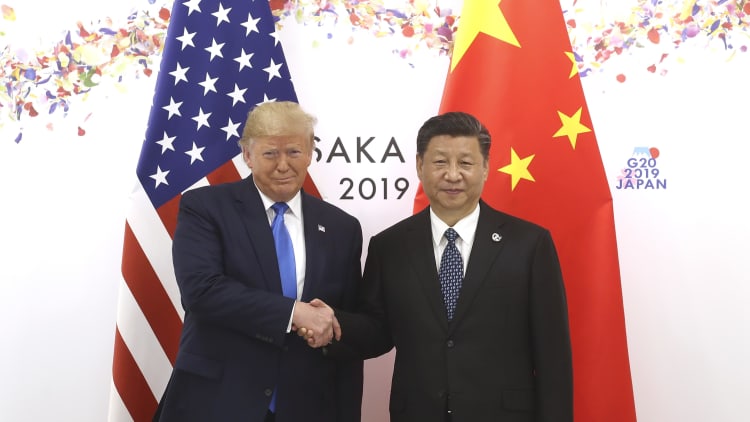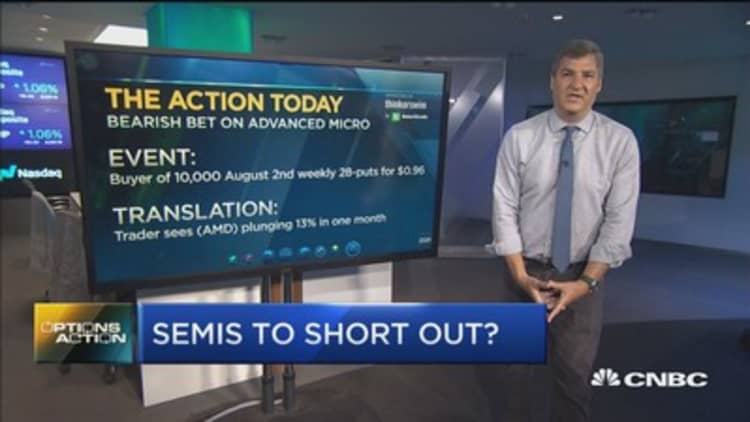
U.S. stocks rose on Monday after the U.S. and China agreed to hold off on slapping additional tariffs on their products in an effort to resume trade talks.
The jumped 0.8% to 2,964.33, a record closing high. The broad index also reached an intraday record of 2,977.93. The Dow Jones Industrial Average gained 117.47 points, or 0.4%, to end the day at 26,717.43 as Nike and Apple outperformed. The Nasdaq Composite jumped 1.1% to 8,091.16 and posted a four-day winning streak.
Chipmaker shares rose broadly. Skyworks Solutions gained 6% while Micron Technology advanced 3.9%. Shares of Qualcomm and Broadcom climbed 1.9% and 4.3%, respectively. Tech giant Apple also rose 1.8%.
"The markets appear to be content with the cooperative tone coming out of the meetings. To me, it felt like the contrarian play was to the upside post meetings," said Dan Deming, managing director at KKM Financial. "There was a great deal of bearishness in sentiment headed into the meeting. Many market observers were discounting any change in the narrative, which made many believe the risk was to the downside."
At its session high, the S&P 500 was up 1.2%. The Dow and Nasdaq rose as much as 290 points and 1.8% respectively.
The major indexes started paring their gains around midday in New York. If it weren't for the big gains from chipmakers and other technology stocks on the Huawei reprieve, it would likely be an average slightly higher market day in reaction to the trade truce.

"There was a fair amount of exuberance at the open. I don't know if it was celebrating good news or the absence of bad news," said Willie Delwiche, investment strategist at Baird. "Either way, we started strong. The problem is, while we had a new high on the S&P 500, the number of individual stocks making new highs was shy of what we say back in late June," when the index made its latest record close.
"I don't want to overstress the importance of it, but it is not confirming the index-level highs," Delwiche said.
Monday's gains got Wall Street starting off the second half of the year on the right foot following a big first half. The S&P 500 rallied more than 17% to start off 2019, notching its best first half in more than 20 years.
That surge came after stocks recovered in June from a torrid May performance. The Dow soared 7.2% in June, its biggest gain for that month since 1938. The S&P 500, meanwhile, jumped 7.9% for the month, marking its best June performance since 1955.
President Donald Trump and Chinese President Xi Jinping agreed not to impose new levies on U.S. and Chinese goods after meeting on the sidelines of the G-20 summit in Osaka, Japan on Saturday.
Trump said the meeting went as well as it could have, noting: "We are right back on track." Chinese state-run news outlet Xinhua said the two leaders agreed to "to restart trade consultations between their countries on the basis of equality and mutual respect."
Trump added the U.S. will ease restrictions on American companies from selling products to Huawei, a giant telecommunications company from China. The U.S. barred companies from selling to Huawei in May, citing national security concerns. The U.S. president also said China would "buy farm product."
Investors anxiously awaited the meeting between Trump and Xi as they looked for clues on whether the world's largest economies would resume trade negotiations or if the conflict would be prolonged.
Chetan Ahya, global head of economics at Morgan Stanley, described the meeting's outcome as "an uncertain pause."
There is "no immediate escalation, but still no clear path towards a comprehensive deal," Ahya said in a note Sunday. "As things stand, we lack clarity on whether real progress was achieved on the sticking points that caused talks to break down in the first place. Hence, our overarching conclusion is that the developments over the weekend on their own don't do enough to remove the uncertainty created by trade tensions."
Comments from Larry Kudlow, director of the National Economic Council, added to the uncertainty around U.S.-China trade relations. Kudlow told Fox News on Sunday that Trump was not granting Huawei "general amnesty." He also said there is no timetable for when a deal might be finalized.
The lingering uncertainty around U.S.-China trade relations will continue to dampen the outlook on corporate earnings, said Larry McDonald, editor of The Bear Traps Report.
"There's a substantial decay factor developing inside the S&P 500's earnings picture," McDonald said. "CFO's cannot make decisions with a purgatory of uncertainty, endlessly ... hanging over the market. The equity rally is a screaming sell."
Calendar second-quarter earnings for the S&P 500 are expected to fall on a year-over-year basis, according to FactSet data. Analysts also lowered their third-quarter earnings forecast to show a contraction from the previous year, as profit expectations for multinationals with exposure to China have soured.
China and the U.S. have been embroiled in a trade war for more than a year. In that time, the U.S. has slapped tariffs on more than $250 billion worth of Chinese imports. China has retaliated with levies of its own on U.S. products.
—CNBC's Michael Bloom and Everett Rosenfeld contributed to this report.


